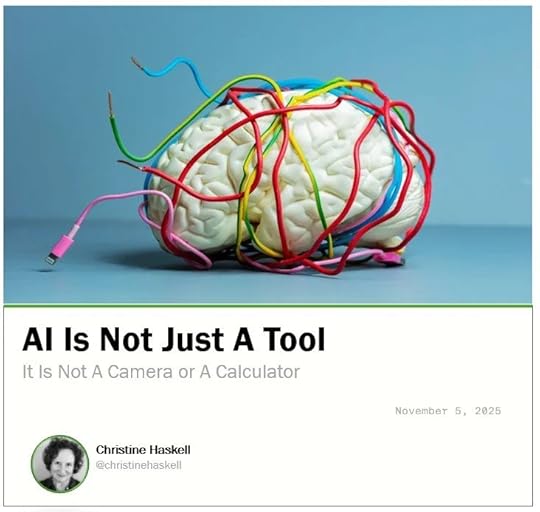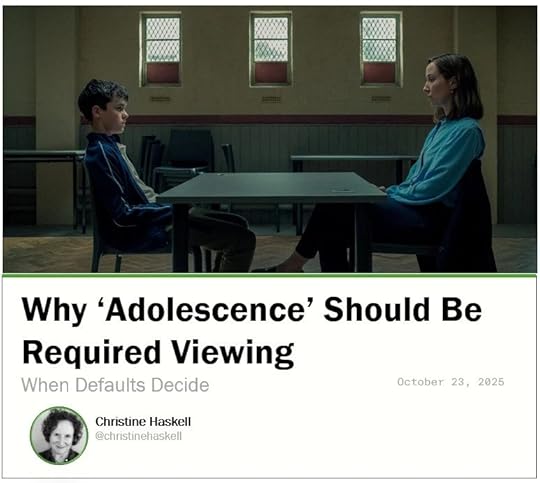Christine Haskell, Ph.D.'s Blog
November 5, 2025
Stewardship for the 99%: A Manifesto

We are at a crossroads
In the fall of 2025, Microsoft’s President for Central Europe and Central Asia told a ballroom full of leadership scholars, most of whom paid dear...
AI Is Not Just A Tool
 From Tool to Institution
From Tool to InstitutionAt every conference, someone reaches for the tranquilizer ...
October 29, 2025
Built to Hold, Not Hype
Today I got one of those spammy LinkedIn-feed-our-algorithm emails. I never answer them, but the comment thread bothered me. Most do. Echo chambers of agreement don’t add much value, build community, or foster connection. I try, in my own way, to do that. So here goes.
...October 23, 2025
When Defaults Decide
 What “Adolescence” Teaches Us about Self-regulation, Hope, and Harm
What “Adolescence” Teaches Us about Self-regulation, Hope, and HarmThe show’s craf...
Skipping Bloom Is Dorian Gray in Academic Drag

At a recent leader conference, an instructor bragged that AI lets students “jump t...
September 20, 2025
The Dorm Room Is Still Open
 Your policy window is narrowing.
Your policy window is narrowing.FaceMash wasn’t a prank; it was a prototype—rating women like trading cards. I even watched an MSDN colleague rank dates in an Excel “m...
September 19, 2025
Belonging Isn't Enough
 1. The Confusion Between Belonging and Mattering
1. The Confusion Between Belonging and MatteringBelonging is easy to manufacture—rituals, slogans, smiles that signal harmony. It reassures, but doesn’t guarantee subst...
September 12, 2025
If the Campfire Goes Dark
 The Leadership Lesson of Avoidance We Can’t Outsource1. The Crisis of Avoidance
The Leadership Lesson of Avoidance We Can’t Outsource1. The Crisis of AvoidanceWe don’t just avoid conflict. We engineer around it.
For ten years, I’ve researched how le...
September 11, 2025
If They Shine, You Shine
 1. The Crisis of Zero-Sum Leadership
1. The Crisis of Zero-Sum LeadershipKamala Harris, reflecting on her early days as Vice President, wrote:
“Their thinking was zero-sum: If she’s shining, he’s dimmed… No...
March 11, 2025
AI, Adaptability, and the Stories We Tell Ourselves
Artificial Intelligence (AI) is rapidly changing how we work, make decisions, and define success. But when AI or any new technology suggests something unexpected, how do you react? The answer is shaped more by your experiences than the technology itself and more to do with your Data Biography — the sum of your experiences, reactions, and assumptions about data that shape how you engage with new innovations. By understanding your data biography, you c...



